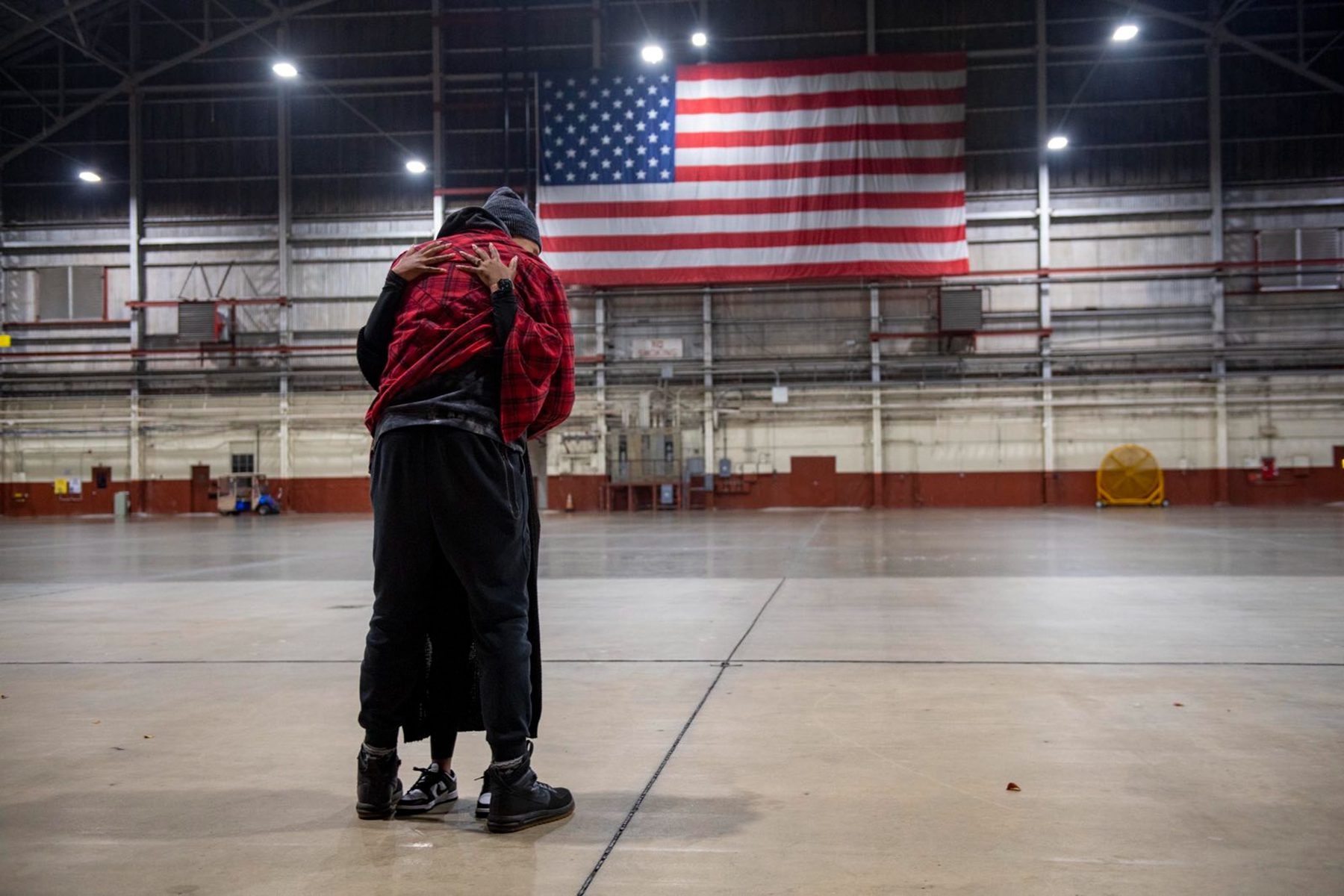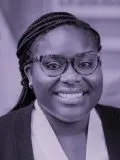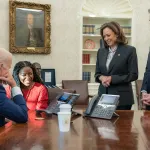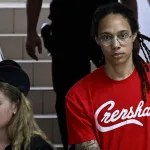For more stories like this, subscribe to our newsletter today.
After nearly 10 months, WNBA star Brittney Griner has arrived home from her detainment and even broken her silence on social media. Now the questions on people’s minds are what it will take to get her ready for the journey ahead and how to keep the issues highlighted by her detainment — including pay equity in women’s sports and the continued imprisonment of Americans overseas — in the spotlight.
But first, people are focused on loving on Griner.
“Every day since Thursday [Griner’s release] has been a great day,” Terri Jackson, Women’s National Basketball Players Association executive director, told the 19th. “My first thought was … Oh my gosh, she’s home. She’s home. We’re complete. We are 144.”
Griner, 32, was arrested in February when Russian authorities found vape canisters with cannabis oil in her luggage. She had played professional basketball in Russia during the WNBA off-season since 2014 to supplement her income. WNBA players typically are paid far less than the men in the NBA: While the average base salary for an NBA player this year was about $5 million, the average for a WNBA player was about $130,000, though high-profile players receive much more.
Griner pleaded guilty to the drug charges against her on July 7, during her trial. She stated that she had never intended to break the law. Griner had started a nine-year sentence in a Russian penal colony when she was released in exchange for the release of the Russian arms dealer Viktor Bout, who was serving a 25-year sentence in federal prison.
During her detainment, little of Griner’s progress was shared for security reasons, with much of the information that was made public coming from those closest to her, including her legal team, agent, and spouse. The family has declined media requests and asked for privacy as Griner readjusts to her life.
Her supporters are honoring that, and say the most important thing is that she’s home.
-
More Like This:
“Nobody loves you like your family,” said Jackson, who has not spoken directly with Griner since her return. “I wouldn’t want to interfere with, or interrupt a minute of private time and get to have with her. I texted Cherelle. And I said, ‘I can be there today, tomorrow, next week, three months from now. You guys let me know when you’re ready.’ When they let me know that, that’s when I’ll talk to her. That’s when I’ll do that.“
On Friday, in her first official statement following her release from Russian custody, Griner made clear two things: She’s in no short supply of gratitude for the efforts that led to her freedom, and she’s on her way to rebuilding her life — including getting back to the game she loves.
“It feels so good to be home!” Griner wrote on Instagram. “The last 10 months have been a battle at every turn. I dug deep to keep my faith and it was the love from so many of you that helped keep me going. From the bottom of my heart, thank you to everyone for your help. “
Griner also thanked those whose efforts made her freedom possible, like her wife, fans, her WNBA family, legal team, advocacy organizations like Bring our Families Home and the entire Biden administration.
Griner also shared her intentions to support the release of other American detainees, like Paul Whelan, a former U.S. Marine who has been detained in Russia since 2018 after being accused of espionage, saying: “I will use my platform to do whatever I can to help you. I also encourage everyone that played a part in bringing me home to continue their efforts to bring all Americans home. Every family deserves to be whole.”
A spokesperson with the State Department declined to comment on details of the program’s workings, citing privacy concerns and referred to the sentiments in Griner’s statement.
The Richardson Center, which negotiates for “the release of American prisoners and hostages held in hostile regimes or in countries with strained diplomatic relations” supported and worked alongside Griner’s team to ensure her release. In a statement, the center commended the Biden Administration on securing her release and underscored the need for the continued efforts and people like Griner for supporting the nonprofit’s work.

“Often, the price we pay for bringing our fellow Americans home to their families is unseemly, but it is the right thing to do — for our fellow Americans, their families, and for our nation,” said Bill Richardson, the former New Mexico governor, and cabinet secretary who founded the organization. “We remain very concerned for Paul Whelan and committed to continue to work on his safe return, as we have been for the last four years.”
Advocates applauded the work it took to get Griner home, even as they acknowledged that there is work still to be done. Jotaka Eaddy, founder of the Win With Black Women Collective, an advocacy organization for Black women leaders, called Griner’s release “the result of pressure, power and prayer.”
“There’s a sense of power because when I think about today, it’s a direct result of the best of our democracy, the advocacy of Black women,” Eaddy told The 19th. “So many civil and human rights leaders, LGTBQ leaders … a broad coalition of those committed to justice for Brittney who were relentless and consistent in the fight to keep her at the forefront of the hearts and minds of every American and the administration. They heard the voices of all of us and they continued to fight for Brittney.”
That broad coalition included “the same organizations that mobilized to get the Respect for Marriage Act [passed], ensure voting rights protections, lead the fight for reproductive rights, pay equity, and on and on,” Jackson said. “Make no mistake, there was a global effort — especially across the global sports community — but Americans championed this campaign to get one of their daughters home.”
-
More from The 19th
- Pleas, letters and negotiations: Brittney Griner’s long road home
- ‘We can’t take this for granted’: Black LGBTQ+ women and nonbinary leaders celebrate Brittney Griner’s release
- ‘I see myself in her’: Brittney Griner’s Russia trial resonates with queer Black women and nonbinary people
Following Griner’s arrest, questions surrounding her well-being, mental health and next steps were on the minds of her supporters. Now that she’s free, some of the work to smooth her transition back to the United States has already happened, during her stay at the Brooke Army Medical Center at Joint Base San Antonio-Fort Sam Houston.
Post Isolation Support Activities, or PISA, is a process under the purview of the U.S. Department of Defense that “recovered” persons undergo once they’re returned home. It includes physical and psychological evaluation, provision of necessary support, and preparation for a safe and healthy reuniting with their family, friends, and society. Griner also acknowledged the PISA staff and medical team in San Antonio.
Griner has also promised her fans that they’ll see her back with her team, the Phoenix Mercury, in the upcoming WNBA season starting in May.
“I look forward to being able to say ‘thank you’ to those of you who advocated, wrote, and posted for me in person soon,” Griner wrote in her Instagram post.
During her detainment, the WNBA made the decision to honor the final season of Griner’s contract, resulting in her becoming an unrestricted free agent. For the championship-winning center, this means there’s no guarantee of a spot on the team as a core member until she officially re-signs a contract in February.
Griner’s status restricts Phoenix Mercury Coach Vanessa Nygaard and the organization from confirming or commenting on her return, but they have been overwhelmingly supportive of her and the efforts to bring her home.
“I think she’s one of the best basketball players in the world and an important player for the WNBA, an important player for USA basketball, someone who’s had a tremendous impact collegiately and in the pros,” Nygaard said. “It’s just wonderful that, you know, she loves the game so much that she wants to return.”
In July, Nygaard made headlines after commenting on the inequities in treatment and things like pay equity for men and women athletes and its role in Griner’s circumstances.
“If it was LeBron, he’d be home, right?” Nygaard in a statement. “It’s a statement about the value of women. It’s a statement about the value of a Black person. It’s a statement about the value of a gay person. All of those things. We know it, and so that’s what hurts a little more.”
While the undertaking to bring Griner home is done, supporters agree that now the task is to show up for the conversations uplifted during her detainment, like equity.
“Travel concerns in the W,” Jackson said, referring to the WNBA. “Pay equity in the W. I think those are issues that have been further underscored throughout this ordeal … we need to ramp up all efforts to address these concerns,” she told The 19th.
“We need everybody across the . . . women’s sports ecosystem to have an honest conversation about pay equity and investment in our sports,” Jackson continued. “I hope to engage with any and everyone in this ecosystem to have that conversation and to come up with solutions. Let’s take a look at the women at the stadium and prepare to march alongside them.”
Errin Haines contributed to this article.








